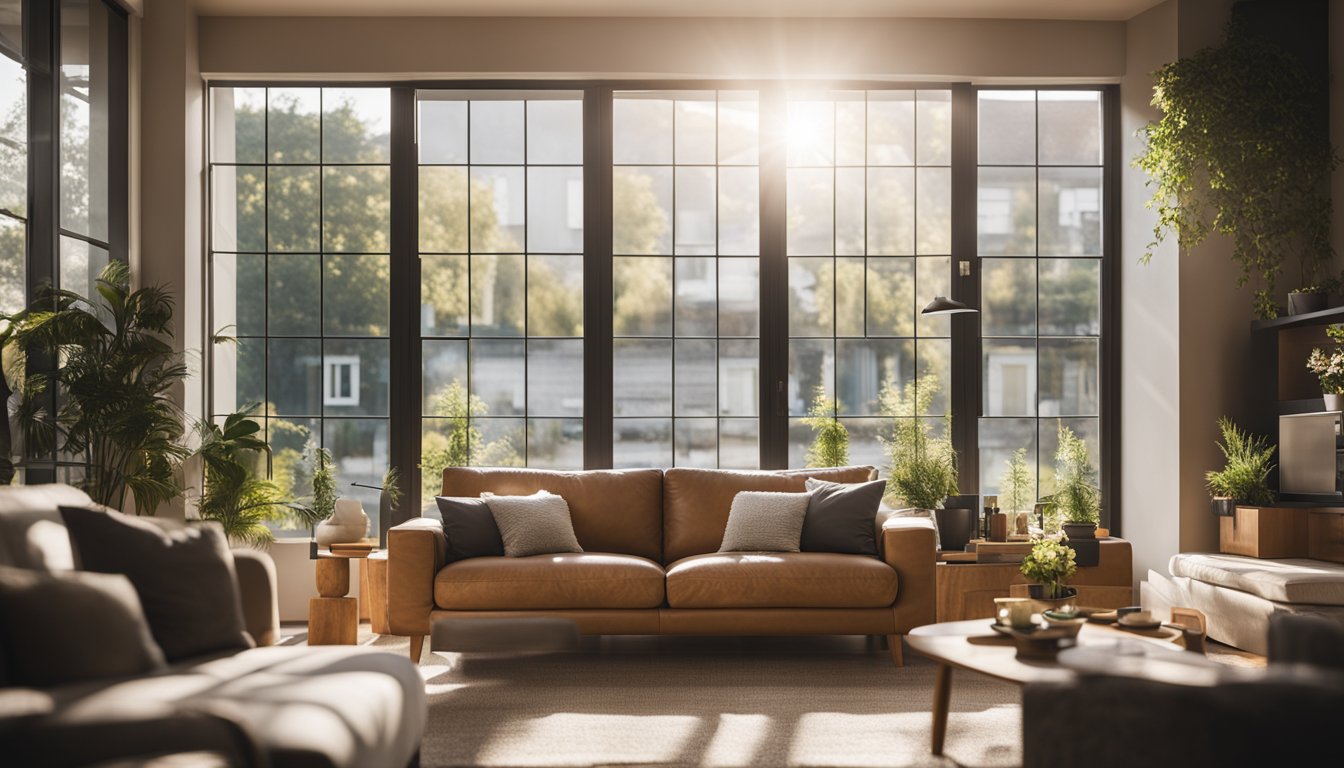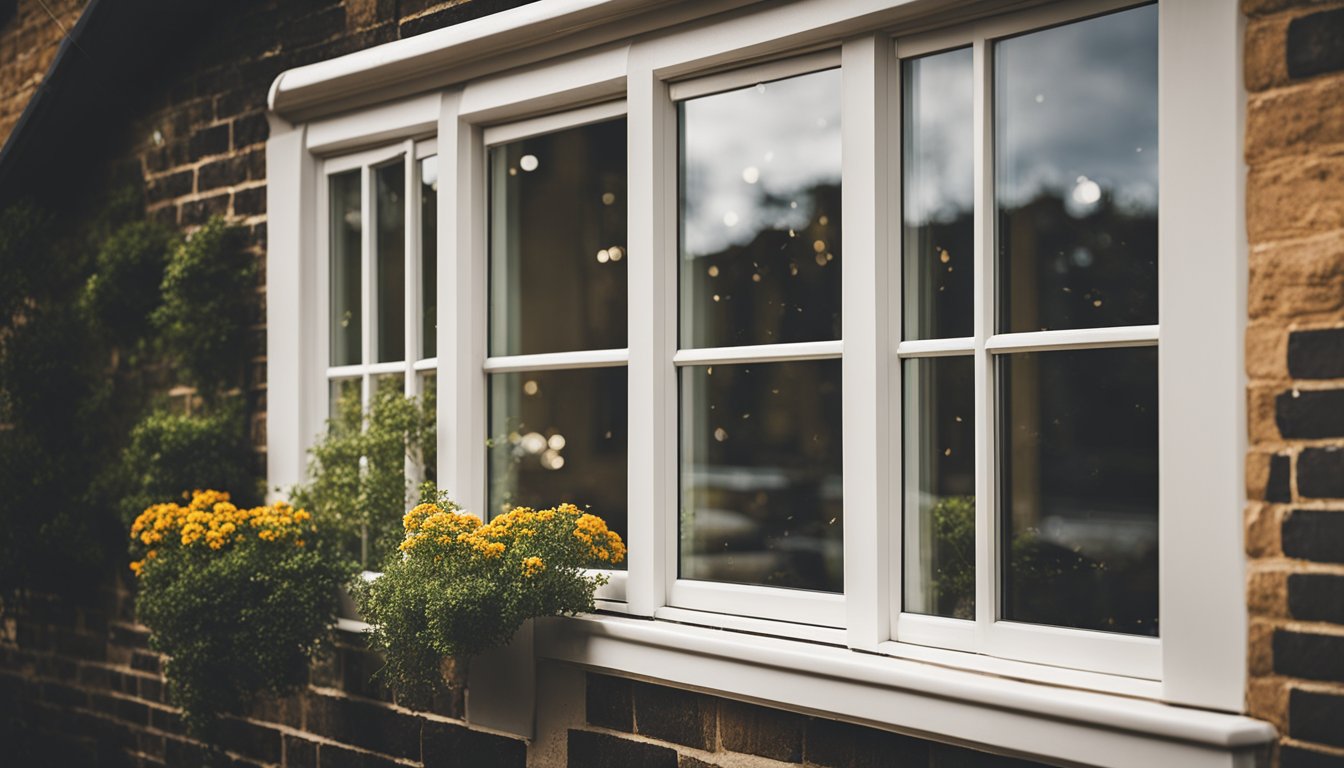Late updated: 11 Jul 2024 13:07
Written by: Eleanor Hartman
Energy-Saving Benefits Of Double Glazing In The UK: Enhance Home Efficiency
Do you know how much money you could save by installing double glazing in your home? By installing double glazing, a single-glazed detached home in the UK could save up to £115 on energy bills annually. As energy prices continue to rise, it’s crucial for homeowners to find effective ways to reduce their energy consumption and costs. Double glazing offers a straightforward solution – not only does it make your home more energy-efficient, but it also adds value to your property.

Energy-efficient windows are more than just a financial benefit. They contribute significantly to reducing your carbon footprint, which is a major concern for many of us in the current climate crisis. Beyond the obvious energy savings, double glazing also provides better sound insulation, increased security, and a more comfortable living environment.
When you consider that 18% of heat loss occurs through windows, investing in double glazing seems like a no-brainer. The modern double-glazed windows come with improved technologies and aesthetic options that fit seamlessly with different architectural styles. These enhancements make double glazing an investment worth considering for any UK homeowner wanting to combine cost savings with environmental responsibility.
Key Takeaways
- Double glazing can save up to £115 on annual energy bills in single-glazed homes.
- It enhances energy efficiency, reduces carbon footprint, and provides better sound insulation.
- Modern double glazing offers improved technologies and aesthetic options.
Understanding Double Glazing and Its Components
Double glazing offers a significant boost in energy efficiency for homes in the UK. By examining its composition, comparing it with other glazing options, and considering the materials used, we can appreciate its advantages.
Components of Double-Glazed Windows
Double-glazed windows consist of two glass panes separated by a gap, which is usually filled with argon gas. This setup creates an insulating barrier, reducing heat transfer significantly. The gas and the space between the panes contribute to a lower U-value, meaning better insulation.
The outer pane often has a low-emissivity (Low-E) coating which reflects heat back into the room, maintaining warmth in winter. Each component is designed to improve energy efficiency while limiting noise from exterior sources.
Comparing Double, Triple, and Single Glazing
Single glazing uses just one pane of glass and offers minimal insulation with higher heat transfer. This option has the highest U-value, making it less efficient for energy savings.
Double glazing, on the other hand, utilises two panes and an insulating gas like argon, reducing heat transfer and lowering the U-value significantly. It's a balanced choice for energy efficiency and cost.
Triple glazing includes an extra pane of glass and another layer of gas, further enhancing insulation. While its U-value is the lowest, offering superior energy savings, the cost is higher compared to double glazing. The choice between these depends on specific needs and budget.
Materials and Build Quality
The quality of double-glazed windows depends on the materials used. Glass types can vary, with Low-E glass being a popular choice for better insulation. The frame materials—commonly uPVC, aluminium, or wood—impact both insulation and durability.
uPVC frames offer good insulation and are low maintenance, whereas aluminium frames are durable but less thermally efficient. Wood frames provide excellent insulation, though they require more maintenance.
Build quality also hinges on manufacturing precision. Proper assembly is crucial for ensuring the gas remains sealed and the panes are correctly spaced. Quality seals prevent gas leaks and ensure longevity, safeguarding the investment in double glazing.
Double glazing's construction allows it to effectively reduce energy consumption, making homes more comfortable year-round. By understanding its components, comparing it with single and triple glazing, and examining the materials used, we can make informed decisions about the best glazing options for our homes.
Benefits of Double Glazing for UK Homes

Double glazing offers numerous advantages for homeowners in the UK, encompassing significant energy savings, improved house comfort, and enhanced property security.
Enhanced Energy Efficiency and Lower Energy Bills
Double glazing greatly improves energy efficiency in homes. With two panes of glass and a layer of inert gas between them, these windows slow the transfer of heat. This means houses stay warmer in winter and cooler in summer, reducing the need for central heating and air conditioning. As a result, energy bills are noticeably lower. According to the Energy Saving Trust, upgrading from single to double glazing could save up to £115 annually on energy costs.
Heat Retention and Reduction In Heat Loss
Heat loss through windows is a major issue in UK homes. Double glazing significantly reduces this problem. The insulating layer between the glass panes acts as a barrier to heat escape. This retention of warmth ensures that homes remain comfortable even during the colder months. Studies indicate that double glazing can prevent heat loss at nearly twice the rate of single glazing, making it an essential upgrade for modern homes.
Damp Prevention and Reduced Condensation
Condensation forms when warm, moist air contacts cooler surfaces, a common issue with single-glazed windows. Double glazing addresses this problem effectively. By keeping the interior pane closer to room temperature, it minimises condensation buildup on windows. This reduction in dampness helps to prevent mould growth, which can cause structural damage and health issues. Furthermore, it ensures a clear view through your windows, enhancing both the aesthetic and functional aspects of your home.
Noise Reduction and Increased Security
Another key benefit of double glazing is its ability to reduce noise pollution. The extra pane of glass and the space between them act as a sound barrier, significantly lowering the amount of external noise that enters your home. This is particularly beneficial for those living in busy urban areas. Additionally, double glazing enhances security. The robust structural design makes it harder for intruders to break through. This added layer of protection provides peace of mind and helps safeguard your property.
Boosting Property Value and Appeal
Investing in double glazing can also increase the market value of your home. Potential buyers often seek properties that offer energy efficiency and comfort. High-quality, energy-efficient windows can make a house more attractive to prospective buyers. In many cases, the cost of installation is offset by the increased property value and the energy savings realised over time. Thus, double glazing is not just an improvement to your living environment but also a sound financial investment.
By incorporating double glazing, we can significantly enhance the comfort, efficiency, and overall value of our homes. With lower energy bills, improved heat retention, reduced condensation, and increased security, this investment offers tangible benefits that make it well worth considering.
Frequently Asked Questions

Double glazing offers significant energy savings, reduces heat loss, and can even increase the value of your property. Let's explore some common questions about its benefits and installation.
What is the energy efficiency rating for double glazed windows?
Energy efficiency ratings for double glazed windows range from A++ to E. The higher the rating, the better the window is at insulating your home and saving energy. Most energy-efficient windows in the UK often fall within the A to C range.
How can one calculate the potential energy savings of installing double glazing?
To calculate potential energy savings, you can utilise online calculators provided by credible sources such as the Energy Saving Trust. Input details about your current windows, property type, and energy usage to estimate savings. Typically, double glazing can save up to £115 per year for a single-glazed detached home.
What grants are available for installing energy-efficient windows in the UK?
The UK government occasionally offers grants and funding options to encourage energy efficiency. Programmes like the Green Homes Grant may cover part of the costs for installing double glazing. It's advisable to check with local authorities or energy suppliers for the latest schemes.
What is the typical cost for installing energy-efficient glazing?
The cost of installing double glazing can vary widely based on the type of windows and the size of your home. On average, homeowners may expect to pay between £500 and £3,000 per window. This cost can be offset by the long-term energy savings and increased property value.
How can double glazing help in minimising heat loss in UK homes?
Double glazing consists of two panes of glass with a gap filled with air or an inert gas like argon, which reduces heat transfer. This design significantly minimises heat loss from homes, leading to warmer interiors in winter and lower heating bills.
What increase in property value can be expected from installing double glazed windows?
Installing double glazed windows can increase your property value by improving its energy efficiency and reducing utility costs. While exact figures vary, estate agents often see a positive impact on the marketability of homes with modern, energy-efficient glazing.